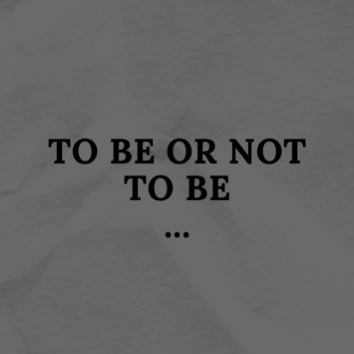TO BE or NOT TO BE? Hope or Paralysis in times of COVID.
This short article provides a sneak peak of the next topic under discussion, with the same title of this article. The discussion is part of a Series of Discussions: "Nymphs! Let your voices be heard." The aim of these discussions is to encourage you to join our debates, to get to know us and the work we do. We hope you will become regular participants in our LIVES and share our passion in the work we do with young people. We would like you to spread the word about what we do.
"To be, or not to be" is the opening phrase of a soliloquy given by Prince Hamlet in one of William Shakespeare's most acclaimed and well known plays Hamlet. In the speech, Hamlet finds himself contemplating death and suicide. He questions the "virtuousness" of suffering and whether "tis nobler to suffer in the mind," expressing sorrow over the pain and unfairness of life but acknowledging that the alternative might be worse (Wikipedia).

Death comes in various packages...some say that to live, is to die, everyday. Last week Maria Matias mentioned something quite extraordinary. She said, when we are young, we fail to imagine; we fail to see our older self and thus we don't prepare for the inevitability of aging and "old age" and all the challenges associated with it. Much in the same way that death is "unattainable" until...it arrives!
Covid has suddenly seemed to put this "unattainable" thing called death, and its favourite cronies: sorrow, isolation and pain, into perspective. Suddenly its on our radar (independently of age, creed, sex, ethnicity etc). Suddenly it's all around, everywhere, entering and taking lives, both young and old, rich and poor. It discriminates not. But this shaking the world is experiencing is not only about witnessing large-scale death playing out before our very eyes or how governments try to appease its apparent growing grip on life, it's about a much greater/wider force or cause. Hamlet's existential soliloquy brilliantly put it simply: to be or not to be?
The Pandemic as we know, whether by means of the "illness" or the "remedy" it has been given, is seemingly paving the way for a greater (world-wide) "cure" (I'm not only referring to the physical, but also to the spiritual, emotional and mental), while at the same time, it's having widespread side effects, like rising suicides, also of the economic, financial and social kind. Pretty oxymoronic, don't you think?
It is yet to be discovered whether the so-called remedies (including confinement) being administered for COVID, will have a more adverse effect or not on our lives after COVID is gone. And, it will be gone, sooner or later, like all the other Plagues before it, even if it takes over four hundred years to be swept away completely, like the worst Pandemic of all time, the Black Death, also known as the Bubonic Plague. It is said to have started in the late 1320s/1330s in China or Central Asia (history does repeat itself) which wiped out over 75 million people in the world (20-50 million in Europe). Pandemics are not new to us. The issue is, how will mankind deal with it this time around, beyond the normative medical or governmental approach? The greatest mystery is likely to be the best of all "remedies" ... it lies within the mind, in other words, it's a matter of the "mind over matter."
"We are talking about that "place" no one wants to be in..."
We are not here to discuss the "merits" of this Pandemic and/or the measures governments have used to "control it" and "us". Our idea is to discuss the merits of this Pandemic in bringing us to a place many have not been put in before! We are talking about that "place" no one wants to be in: the solitary confinement Hamlet spoke about, also known as "the dark night of the soul."
